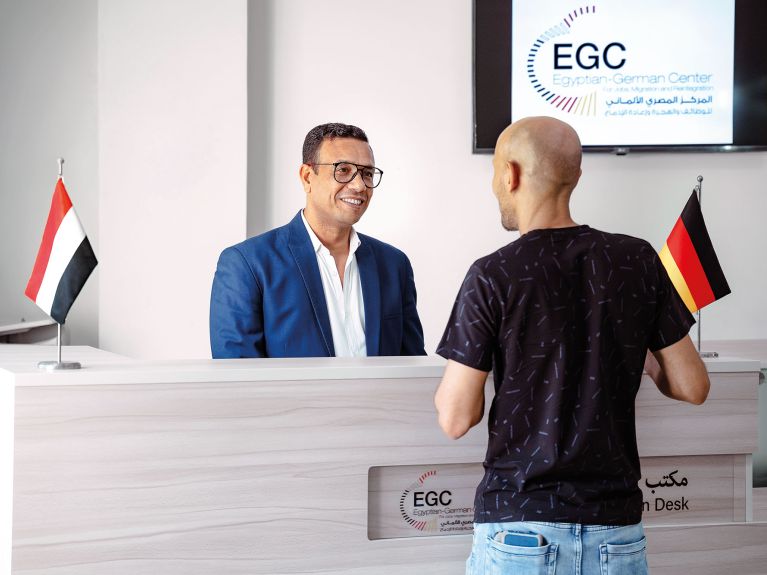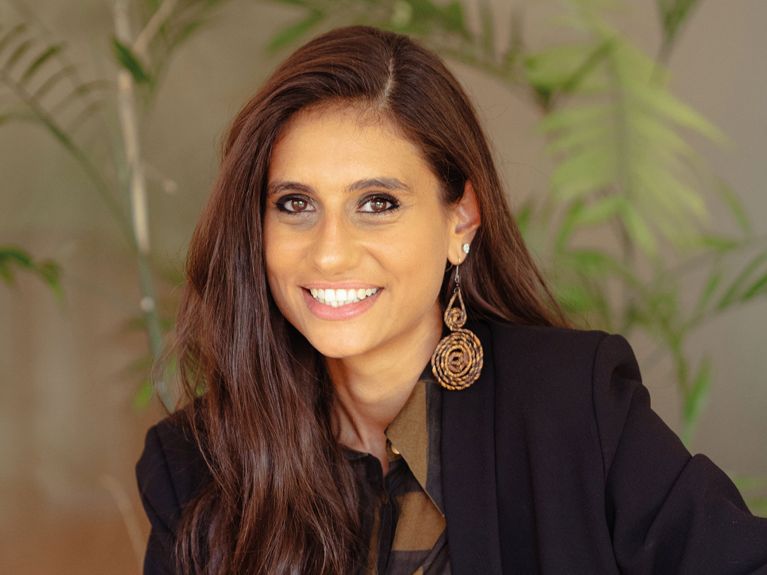Everyone’s a winner!
Germany is raising awareness around regular migration routes and helping skilled workers prepare for life in Germany. Centres in nine partner countries are helping out.

Maadi is a leafy neighbourhood in the south of Cairo. It nestles against the Nile to the east, and largely consists of impressive houses and tree-lined streets. In English, “Maadi” means “ferries”, which is apt given the role of the Egyptian-German Centre for Jobs, Migration and Reintegration (EGC). The centre is located in the heart of Maadi and its job includes helping Egyptians prepare for migrating to Germany – helping them make the crossing, so to speak. Spread over several floors of a building, the EGC includes a generously sized visitors area on the ground floor with offices for staff upstairs.
It started work a little less than two years ago, but that remained almost entirely virtual due to the pandemic. Since then the doors have opened for real and interest is high in what the EGC has to offer. Strictly speaking the centre has three different but connected tasks. Firstly, it exists to help people returning from other countries to reintegrate into Egypt; secondly, it helps prepare people for work in Egypt; and thirdly it advises and supports skilled workers who are making their way to Germany. Initially the centre focused on the jobs market for local residents and returners, but since early 2023 migration through regular routes to Germany has become established as a third pillar of its work.
Huge interest
“Since we opened in 2021 we have conducted over 12,000 individual consultations,” says Shahira Wassef who handles the migration portfolio for GIZ, the German society for international development partnerships, in Egypt. “That’s an enormous number.” Given the high levels of interest and a target audience which is not limited to Cairo, there are now 14 regional offices spread across the whole country.
These are always located in areas where socio-economic factors such as unemployment and poverty drive up the risk of irregular migration. The aim is to offer training and qualifications to improve people’s chances in their local jobs markets, but the offices also provide information on employment opportunities in Germany.
On the German side, GIZ runs the centre on behalf of the German Ministry for Economic Cooperation and Development. They work with representatives of the Egyptian Ministry of Emigration and Egyptian Expatriate's Affairs. This constellation alone shows that these services are in the interest of both sides. Egypt is looking for ways to give its young population a better education and get young people into work, both at home and abroad. Germany needs skilled workers and is therefore prioritising targeted migration for work purposes. The EGC provides advice to visitors according to their situation and what they want. Sometimes it concerns courses and training, such as how to improve someone's skills as an electrical mechanic. Sometimes the EGC provides information on requirements for entering Germany. Many people, and young people, have been able to get valuable help from the centre.

We stopped talking about ‘brain drain’ years ago,now we're talking about ‘brain gain’.
Pilot project opens up migration routes
Through a pilot project entitled THAMM, GIZ is working with the Federal Employment Agency to identify exactly what people need to make the leap to Germany and how best to make that leap. The project was commissioned by the Federal Development Ministry and the European Commission. It is running in Egypt, Tunisia and Morocco and is preparing skilled workers and apprentices to spend the next part of their life in Germany, along with providing help with official matters such as visas. The project is mainly focusing on the hotel and hospitality, baking, electronics, construction, and industrial mechanics industries.
The project has already sent some applicants to Germany. One of them is Hisham Ayman, a young Egyptian who now lives and work in Kitzingen, a small town in northern Bavaria, where he's training to be a chef. He already speaks good German after starting at the Goethe-Institut and is now refining his language skills in Germany. He likes his new surroundings. “I can experience new things and learn new skills,” he says, both at work and elsewhere. What he values about his apprenticeship is how it combines work in the classroom and the kitchen. He says his goal is to pick up as much as he can, complete his training and then to stay on in Germany and open his own restaurant in ten years.
Prospects like this are tempting to many young people in Egypt. However, as Shahira Wassef explains, the programme has “far more applicants than places.” So far, 200 men and women have been able to take part, “but demand is much higher than that,” Shahira Wassef says. The project has received 2,000 applications in Egypt alone. Findings from THAMM are being incorporated into the advice provided by the EGC and are multiplying its impact. “We’re using it to test how vocational mobility can work,” says Wassef, who also explains that there are plans for the GIZ to hand over this service to bodies within the partner country.

Providing knowledge and support across Africa
Though Egypt has a long association with diaspora (an estimated 10% of its population live abroad) it is not the only country which wants to explore and share the opportunities of legal migration. Centres for migration and development already exist in countries such as Ghana, Morocco, Nigeria, Tunisia, Iraq, Jordan, Pakistan and Indonesia, or are under construction. They are all now paying special attention to migration to Europe.
Development Minister Svenja Schulze visited the centre in Ghana along with Labour Minister Hubertus Heil in February 2023. She summed up its goals thus: “Managed properly, migration holds enormous potential for the economic development in our partner countries and in our own country as well.” She went on, “the existing Ghanaian-German Migration Advice Centre has previously focused on helping returning Ghanaians to reintegrate. We want to turn this one-way street into a two-way road.”
Shahira Wassef also rebuts the accusation which is sometimes made that prosperous countries pick off well educated people for their own purposes. Even the preparation for working abroad boosts people's qualifications, to say nothing of working for a German company. Alongside learning the language, experiencing Germany's culture and making contacts, Egyptians in Germany learn many additional skills which they can bring back home later. “We stopped talking about ‘brain drain’ years ago,” Wassef says. “Now we're talking about ‘brain gain’.”